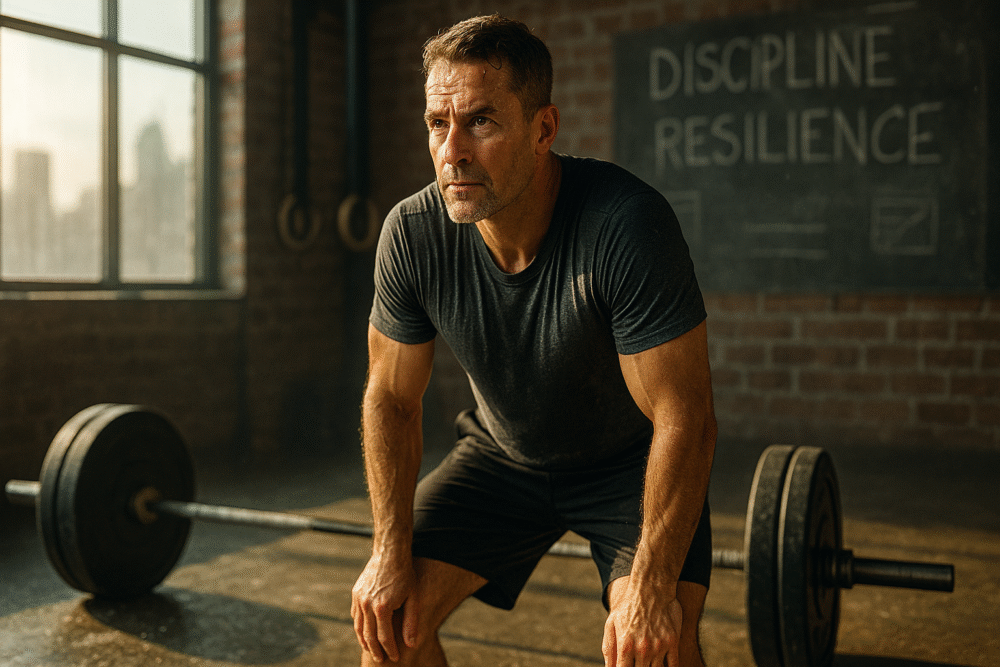Mental Toughness Training Program for Executives: Why Coaching Beats Courses Every Time

Discover the best mental toughness training program for executives. Learn why coaching beats courses and how to unlock resilience under pressure.
Introduction
Executives don’t need another course. They don’t need another binder full of theory, or a weekend seminar with slides that collect dust by Monday morning. What they need is a mental toughness training program that forges resilience under fire—the kind that translates into boardroom clarity, iron discipline, and unstoppable focus.
The myth? That information builds toughness. The truth? Information is cheap—transformation costs sweat, discomfort, and accountability.
That’s where most high-performing men get it wrong. They buy courses, skim books, watch videos—and wonder why they’re still stuck, burned out, or snapping under pressure. The stakes couldn’t be higher: careers, health, marriages, and legacy are on the line.
If you don’t train mental toughness like you train your body, mediocrity will chew you up and spit you out. This playbook will expose what makes the best mental toughness training program effective—and why coaching beats every self-paced course you’ve tried.
Understanding the Core Concept
A mental toughness training program is not just motivational hype. It’s a structured system designed to develop the 4 C’s of toughness: Control, Commitment, Challenge, and Confidence. Real programs put men under stress, test their limits, and force adaptation.
Think of the MTQ-48 assessment—a proven diagnostic tool that measures your toughness baseline. It reveals exactly where you crack under pressure.
Courses and books can teach concepts. A program creates change. The difference is like reading about CrossFit versus sweating through a WOD. One fills your head; the other forges your body and mind.
Executives need the latter, because the corporate battlefield doesn’t reward dabblers. It rewards warriors who train mental resilience daily. That’s why the best mental toughness training program focuses on repeated exposure and accountability, not passive learning.
“Knowledge doesn’t toughen you—exposure does. Toughness is built under weight, stress, and fire.”
Why This Is Important
Executives aren’t losing because they lack knowledge—they’re losing because they lack resilience. Boardroom politics, endless decisions, and high-stakes stress require more than intellect. They require grit. T
hat’s why a mental toughness training program is the differentiator for executives who want to rise above burnout.
In CrossFit, every workout is a battle. The barbell doesn’t care how tired you are. The clock doesn’t care about your excuses. Push through, and you expand your threshold. Shrink back, and you stay weak.
Executives face the same reality: deadlines, competitors, and markets don’t wait for your comfort. Only those who’ve trained their inner edge can stay sharp under pressure.
When I went through MTQ-48 and paired it with my CrossFit training, I discovered blind spots. Discipline under fatigue. Confidence under doubt. Commitment when no one was watching. That integration turned my workouts into laboratories for executive toughness.
The lesson? If you don’t train resilience deliberately, stress will train weakness into you by default. That’s why enrolling in a mental toughness training program matters—it gives structure to transformation.
“Comfort doesn’t scale—resilience does.”
Common Challenges & Limiting Beliefs
Belief 1: “I’ll just take a course.” Reality: Courses don’t hold you accountable. Without feedback, theory fades fast, leaving you exactly where you started without measurable growth or resilience. That’s why executives need a structured mental toughness training program instead of endless passive courses.
Belief 2: “Mental toughness is just physical.” Wrong. Toughness is mental, emotional, and behavioral. The body is just one training ground, but the true battlefield is your mind and emotions under sustained stress. That’s why a holistic mental toughness training program outperforms gym-only challenges.
Belief 3: “I don’t have time.” Truth: Weakness steals more time than training ever will. Burnout and indecision cost more hours than a disciplined program ever will, draining energy and leaving you stuck in cycles of frustration. The best mental toughness training program reclaims lost hours by fortifying your mindset.
Executives cling to comfort because it’s familiar. But comfort is a cage. A program—and coaching in particular—smashes the cage by applying pressure until you grow. That’s why the best mental toughness training program doesn’t coddle. It confronts.
“Excuses are lies you rehearse to stay weak.”

Step-by-Step Implementation Guide
Step 1: Assess Your Baseline
Start with MTQ-48 or a similar tool. You can’t improve what you don’t measure, and awareness becomes the first weapon in sharpening your edge. The best mental toughness training program always starts with accurate measurement.
Step 2: Create Stress Rituals
Design daily practices that push you past comfort—cold showers, timed workouts, challenging conversations. Stress becomes your training partner, carving resilience into your nervous system over repeated exposure. An effective mental toughness training program hardwires stress adaptation into your daily life.
Step 3: Apply Warrior Frameworks
Leverage the 4 C’s. Control your emotions. Commit when it hurts. Reframe challenges as growth. Build confidence by acting under fear, and watch obstacles transform into stepping stones for dominance. A proven mental toughness training program reinforces these frameworks until they’re second nature.
Step 4: Integrate Coaching
This is where courses collapse. A coach accelerates adaptation, identifies blind spots, and holds you accountable. Programs without coaching plateau fast, while coaching forges sustainable transformation that endures real-world pressure. The highest-performing mental toughness training program always includes direct coaching.
Step 5: Train Daily, Not Occasionally
Like CrossFit, toughness compounds with consistency. Sporadic effort builds sporadic results, while deliberate daily practice engrains resilience as a reflex you can depend on under stress. That’s why an elite mental toughness training program emphasizes daily rituals, not occasional motivation.
“Consistency beats intensity when intensity fades.”
Real-Life Success Stories
In my CrossFit training, I discovered mental walls far heavier than barbells. During one WOD, fatigue screamed for me to quit. That moment mirrored executive pressure: deadlines, fatigue, and the temptation to cut corners.
Instead, I pushed. My MTQ-48 results confirmed growth in commitment and control. Coaching accelerated the process—turning my gym lessons into executive armor. It was living proof that a structured mental toughness training program delivers real resilience.
A client once came to me crumbling under corporate chaos. He thought another leadership course would fix it. Instead, we ran him through a mental toughness training program: assessment, resilience drills, and coaching integration.
Within 12 weeks, he wasn’t just managing stress—he was dominating under it. This transformation demonstrates the irreplaceable power of an executive-focused mental toughness training program.
“Toughness doesn’t show up when it’s easy—it’s revealed when it’s brutal.”
Mistakes to Avoid
1.) DIY Training Without Feedback – You’ll repeat your blind spots endlessly, recycling the same mistakes without correction, reinforcing weakness instead of building true resilience that only feedback can forge. Avoid this trap by investing in a professional mental toughness training program with coaching feedback.
2.) Confusing Information With Transformation – Courses inform; coaching transforms, but mistaking the two leads to stagnation, wasted energy, and a false sense of progress that collapses under real pressure. Only a structured mental toughness training program closes that gap.
3.) Quitting When It Gets Hard – The moment of discomfort is the doorway to growth, and quitting slams it shut, guaranteeing mediocrity while denying yourself the very transformation you seek. A consistent mental toughness training program keeps you moving forward.
4.) Treating Mental Toughness as Physical Only – It’s mental, emotional, and behavioral, and reducing it to physical grit alone blinds you to the deeper disciplines that actually sustain lasting strength. A holistic mental toughness training program delivers across all dimensions.
5.) Waiting Until Crisis – Build before you break. Waiting is weakness, and by delaying training until disaster strikes, you guarantee collapse instead of cultivating resilience when it matters most. Resilient leaders commit early to a mental toughness training program to future-proof themselves.
“Mistakes repeated become habits of failure.”
Advanced Strategies for Mastery
Daily Stress Inoculation: Train under controlled discomfort—breath holds, ice baths, or deliberate adversity. Each exposure teaches your body and mind to adapt quickly, forging resilience under simulated fire. A top-tier mental toughness training program includes these practices.
Cross-Training Body + Mind: Physical challenges unlock mental resilience. Push-ups and presentations demand the same grit, and combining both disciplines creates unstoppable synergy between strength and performance. A balanced mental toughness training program integrates both domains.
Archetypal Balance: Warrior for fight, King for purpose, Magician for strategy, Lover for connection. Integration builds indomitable leaders who thrive across every arena of life, not just the workplace. The strongest mental toughness training program includes archetypal frameworks.
Coaching as Catalyst: A program plus a coach multiplies growth. Without it, you stall, but with coaching you accelerate adaptation, expand awareness, and achieve transformation that lasts under stress. An executive-grade mental toughness training program never skips the coaching component.
“The sharpest steel is forged in the hottest fire.”
Call to Action
If you skimmed this, you missed the point. Weak men skim. Warriors study. The best mental toughness training program isn’t a course you dabble in—it’s a forge you endure.
If you’re an executive chasing another certificate, close this page.
If you’re ready to train under pressure, face your blind spots, and sharpen your edge, the next step is clear.
Don’t settle for theory. Don’t settle for mediocrity.
Coaching beats courses because coaching demands transformation.
Still comfortable?
Then this isn’t for you.
Ready to get uncomfortable? Book your Power Strategy Session today.
Q&A Section
Q1: What is a mental toughness training program?
A structured system to build resilience through stress, accountability, and mindset tools—not just information. The most effective mental toughness training program goes far beyond theory.
Q2: Do executives really need mental toughness coaching?
Yes. High-pressure roles demand resilience that courses alone can’t deliver. That’s why a mental toughness training program with coaching is indispensable.
Q3: Is a course enough, or do I need a coach?
Courses teach. Coaches transform. If you want real results, you need both program structure and coaching accountability. A hybrid mental toughness training program gives you both.
Q4: How long does it take to build resilience?
With consistent practice and coaching, measurable progress shows in 8–12 weeks. A high-level mental toughness training program compresses years of struggle into months of growth.
Q5: How do I know if I need coaching?
If stress, burnout, or hesitation costs you clarity and performance, you need it now. Warriors don’t wait—they prepare. That’s when a mental toughness training program becomes the bridge from weakness to resilience.


